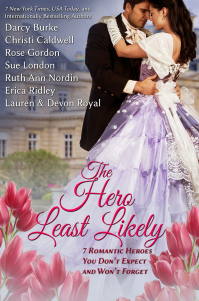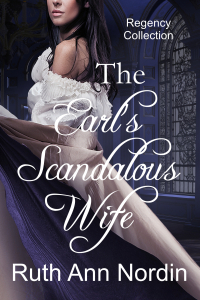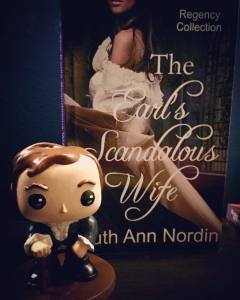Ruth Ann Nordin's Blog, page 52
May 9, 2016
Updates on What I’m Working On (And What’s Soon Coming Out)
There is a lot going on, so I’ll try to keep things brief.
The Mistaken Mail Order Bride is coming out this Sunday (May 15)!

This is book 2 in the Chance at Love Series. Book 1 is The Convenient Mail Order Bride. This one if the sheriff’s story. If you’ll remember, the sheriff was one of Abe’s few friends who helped him out. He was expecting his mail-order bride, and on the day he goes to meet her, he inadvertently marries the wrong woman. ;)
I now have it up for pre-order on Amazon. You can also find it on the other retailers: Barnes & Noble, Kobo, iBooks, and Smashwords.
Multi-Author Boxed Set Coming June 7!
It’s only $0.99!

I’ve recently had the privilege of being asked to join The Hero Least Likely boxed set with bestselling authors Darcy Burke, Christi Caldwell, Rose Gordon, Sue London, Erica Ridley, and Lauren & Devon Royal. I’m sure you recognize those names.
May 6, 2016
#FirstLineFriday
It’s Friday again, so you know what that means. It’s #FirstLineFriday!
Thanks for tagging me, Rami Ungar! If you like science fiction, thrillers, or horror, I think you’ll enjoy his books. He’s one of the nicest people you’ll ever come across on the internet.
Now if you’re unfamiliar with this meme, let me break it down for you. On Fridays, you do the following:
Create a post on your blog titled #FirstLineFriday, hashtag and all.
Explain the rules like I’m doing now.
Post the first one or two lines of a potential work, a work-in-progress, or a completed or published story.
Ask your readers for feedback and then encourage them to try #FirstLineFriday on their blogs (tagging is encouraged but not necessary).
I’m going to pick the very first couple of lines from The Earl’s Scandalous Wife.

“No, I can’t,” Miss Paula Leighton protested. She shook her head, her fists clenched at her sides. “I won’t do it, Stewart!”
I have two neat tidbits to share about this book. April Gregory McPhillips made the Perry doll that is in the picture next to the paperback copy of this book! Isn’t he cute?
Thank you, April!!!!!!

***
If you like the idea of #FirstLineFriday, why not try it yourself? It’s fun, and for novelists it’s great practice on openings. In fact, I think I’ll tag someone.
Okay, let’s look at my most recent followers, see who I want to torture tag…
I choose Lauralynn Elliott (another super nice person I know)! Congratulations, you’re being tortured you’ve been tagged! You have today or next week to do #FirstLineFriday. Good luck, and have fun with it!


April 30, 2016
Z is for Zone
This is it. The last post in the A – Z Challenge. Whew! Now I won’t be clogging up everyone’s inboxes all the time.[image error] Thanks for being patient with me as I did this. It was a fun challenge, and I’m glad I took it. But I can see how it’d be overwhelming to try to keep up with all these posts.
Anyway, without further ado, let’s do the last one….

ID 32416481 © Irantzu Arbaizagoitia | Dreamstime.com
The zone is when writing takes on a magical kind of quality. The words are flowing easily. The story plays out like a movie in your mind, and all you have to do is write down everything the characters are saying and doing. This is the best feeling in the world for the writer.
I wish I could say it’s easy to get into the zone. I’d say I hit this point about 75% of the time when I write. On days when the words aren’t flowing well, I write a couple hundred words, stall, do something else (like writing this blog post), then go back to the story. Most of the time this is because I’m not sure what happens next in the story.
Yes, I can hear the plotters now. “You’d know what happened next if you plotted.” But I can’t plot. Not successfully. Every time I’ve even made a simple outline for my book, things change within a chapter or two because the characters don’t like the plan I came up with. I don’t believe plotting is for everyone. If it works for you, great. For me, I find being a panster is the best way to go. So maybe today’s post is more for pansters.
Below I have a few things to try to get into the zone when you’re writing. If you have any other tips I didn’t think of, or if I’m wrong about plotters having it easy, let me know. I’m all ears.[image error]
Get away from the family. This is often easier said than done. Kids or the spouse can come up to you at any time while they’re around and bother talk to you. Even when you explain that you’re working and need them to leave you alone, chances are only 50% they’ll listen.
Exercise. There is something about exercise that helps boost creativity.
Don’t go online. Again, easier said than done. Emails and social media have a way of beckoning to you when you need to be writing. Sometimes I go to the park or another place that doesn’t have Wifi access.
Sit and write. I tell myself, “Just get 250 words in”. Usually, once I do about 500, things flow a lot easier, and I find myself writing more naturally.
That’s what I have. Got any others? I’d love to hear them!
This post is part of the Blogging from A – Z Challenge. Thanks again for bearing with me as I did this! Now I’ll go back to the posting only a couple times a week.


April 29, 2016
Y is for Yesterday
Today I want to talk about how important it is to focus on the present and move on into the future.

ID 61401353 © Yiorgosgr | Dreamstime.com
We can get stuck in “yesterday” if we’re not careful.
The Trap of Regrets
If only I had done this. If only I had done that. This is the land of regret, and it serves no purpose. Sure, learn from the past. Things we failed out in our writing, publishing, and marketing can be great tools to help us do better next time. But you don’t want to get stuck in the past. There’s no point in gaining experience if you aren’t going to learn from it and do better next time.
This is why I don’t believe in going back and rewriting books that are already published. If you find a typo, go ahead and fix it. But if you keep going back and rewriting everything you write, you won’t have time to work on your current stories. Your fans will want your next book. I know you want to reach new fans, but you can do that with your future stories just as well as you can with past ones. Plus, the more books you have, the better your chances are of being discovered and of making money.
The Importance of Grieving
Now, another case of looking back into the past is the tendency to compare our sales from yesterday to how they’re doing today. I don’t know about anyone else, but once Kindle Unlimited came, my income dropped by 50%. Then there was the pages read thing that popped up in Kindle Unlimited, and my income dropped by 60%. I didn’t go into Kindle Unlimited, and authors who didn’t go into the program were punished. I wasn’t surprised when it happened, but I hadn’t expected the drop to happen so quickly.
I gave myself permission to feel bummed out over this, but I wanted to put a cap on how much time I was going to let myself grieve the loss in income. I didn’t want to get stuck in “yesterday”, but I also knew in order to move forward I had to go through the dark period of mourning. Denying it was only going to delay the process. So I gathered a bunch of sad songs and played them while I wrote my works in progress. Some days were easier than others. Sometimes I wrote while crying. Sometimes I went for a walk. I even decided not to take a trip because I wasn’t in the mood to be social.
Once I gave myself permission to go through the grieving process, I found it a lot easier to take comfort in writing. Writing became the one thing I could do that made me feel better. It took about two months to work through all the stages in the grieving process. Getting over a major blow like that doesn’t happen right away. But by going into the grieving process I had left yesterday in the past and moved forward. Some days I felt like I had started at the beginning. It wasn’t easy. It never is. But there came a day when I was writing and actually found comfort in the sad songs. Then another day came when I was in the mood for an upbeat song. Then I went back to the sad songs. It was a rollercoaster ride of ups and downs. The day did come when I had finally accepted where I was at, and I was at peace with everything.
What I learned from that experience is that income does not always go up. I think this is a myth we’re led to believe. The more books = you’re guaranteed to make more money. Because everything just snowballs. No. Not really. I’m writing more books this year, and my income is still less by 60%. But will staying the past solve anything? No.
The best way to deal with things is by moving forward. That might mean changing the way you’re doing things. Sometimes you have to shift to another plan. Sometimes you stay the course. Each situation is going to be different. All you can do is weigh the pros and cons of each decision and hope you make the right one. And if it turns out you made a mistake, re-evaluate everything, and make the best decision you can. We’re all human. We’re prone to mistakes. The key is not to get stuck in them.
This blog is part of the Blogging from A – Z Challenge.


April 28, 2016
X is for X-Factor
The X-Factor is an unknown or unexplained element that makes something more interesting or valuable.

ID 48398960 © Numax3d | Dreamstime.com
Your main character can’t know everything. He will only know what he personally experiences and what someone tells him. Other than that, he can only “think” he knows something. This is what I call the x-factor in writing the emotionally engaging character. Point of view is not omniscient. It can’t know everything. Its view is going to be limited. So if you want the reader to know something the main character can never know, you will have to give the point of view of the character who does know the answer.
Sometimes what the main character never knows (but the reader does) can be a powerful tool in storytelling.
For example, I have one book where the villain becomes kidnaps the heroine. The hero and a lawman both believe the villain killed his wife. So they’re even more anxious to find the heroine. The heroine finds remains of the wife’s skeleton under the dirt in the cabin the villain took her to, further leading the reader to believe he did kill his wife. Long story short, the book ends with the hero, heroine, and lawman believing the villain killed his wife. But I (the author) knew this was not the case. So I had to insert a scene in the villain’s point of view where he remembers his wife tripping on her dress and falling down the stairs, thereby breaking her neck (and dying). So though he is a villain in every sense of the word, he was innocent of murdering his wife. The only way the reader was going to know this was if I inserted his point of view. Otherwise, the reader would go on believing he killed her.
That is the x-factor at work when you’re writing fiction.
Some of my favorite scenes in movies, TV shows, and books are those in which I’m given additional information the main characters never receive. And this helps demonstrate the power of point of view. Point of view is limited. It is narrow.
In real life, we have a limited view of things. We can only know what we pick up with our five senses (touch, taste, smell, hear, and see). When someone tells us why they did something, we have to take their word for it. We can’t know with 100% accuracy that things really happened the way they told us. For all we know, they could be lying to us. But regardless of the situation, we pull in everything we experience with our five senses and from what others tell us. Then from this, we develop a set of beliefs about ourselves the world around us. We develop bias. We make judgments based on what we think is right within our limited view of the world. In other words, we have tunnel vision.
The same needs to be true for your character if the character is going to be “real” to the reader. The more I learn about point of view, the more I love it. It is a tool that really allows us to delve deep within our character.
Don’t be afraid of your character not knowing everything. That’s okay. It’s actually realistic if the character doesn’t get all the answers in a neat little package. Instead, play around with giving the reader additional pieces of the puzzle by using other characters’ points of view.
Now, this doesn’t pertain to every story you’ll write, but it can pertain to some. And it might even make the story that much more intriguing.
This post is part of the Blogging from A – Z Challenge.


April 27, 2016
W is for Writer’s Block
There’s a debate over whether or not this actually exists. I’ve heard convincing arguments against it, but I still believe this exists. Anything that prevents a writer from being able to sit down and write the story is writer’s block (at least in the way I define it).

ID 69428317 © Gearstd | Dreamstime.com
The sources of writer’s block varies.
It can be real life demanding you tend to more urgent needs (such as an illness or filing taxes).
It can be exhaustion. (This is why I recommend taking two days off a week from writing to refresh yourself. I don’t believe a writer needs to write every single day. Setting up days off to regroup can really help for the longterm stamina needed to consistently publish books through the year.)
It can be something in the story that isn’t going right. Maybe the character is leading us in one direction, but we think the character is making a huge mistake so we try to steer the character in another direction. (Most of the time, this is why I hit writer’s block.) Sooner or later, the character totally rebels and stops altogether. You can force the issue, but the story ends up sucking when you do. (And yes, I’ve done this, only to regret it.) This is why I believe in letting the characters lead all the time, even when it scares me.
Whatever the issue, there are times when you can feel stuck.
What can you do to help combat it?
The hardest part can be pulling yourself up out of the writing funk. I have a few tips. If anyone has any they’d like to add, feel free to add them.
Work on something else. The only problem with this is that you might get sidetracked and end up ditching the original story. You want to finish the original story. This probably works best if you can write more than one story at a time. But if you can work on the second story, finish it, and then get back to the original, you’ll be okay doing this method.
Write ahead. If you know for sure a scene will be coming up in the story, go ahead and write it out.
Try writing 250 words and see how things go. I learned this tip from a podcast Joanna Penn did with James Scott Bell, except he said he does 350 words. I thought he said 250. I just read the transcript and see I was wrong by 100 words. But I think the principle is still a good one. Try a little bit and see if it gets things going. Here’s the site for the podcast info: http://www.thecreativepenn.com/2015/0...
A tip I just learned from another podcast at The Creative Penn that Joanna had with Michaelbrent Collings sounds promising. The basic idea is to put something ridiculous into the scene to get things rolling. So if you’re hero is trapped in a room, and you are trying to figure out how to get him out, you can do something like have a bird come into the room and say, “Let’s get out of here.” The hero would ask the bird, “How are we going to do that?” Then the bird might say, “There’s a window over there.” Then you take out the bird and write the scene. I’ve tried this a couple of times already, and I think it actually works. I don’t write in the bird. I just imagine the bird. I hate rewriting anything, so the less typing I do, the better. But you can modify this idea to fit your personality as a writer. Here’s the link if you want to hear more from this podcast: http://www.thecreativepenn.com/2016/0...
Step away and take a break. Sometimes you just have to do that. And there’s nothing wrong with taking time off to regroup if you need to do it. I know being vigilant is important, as I wrote in my last post. But I also know there’s a time when you have to take a break.
The blog is part of the Blogging from A – Z Challenge.


April 26, 2016
V is for Vigilance
Today, I want to talk about vigilance in the life of a writer.

ID 65345668 © Olga Medvedeva | Dreamstime.com
Vigilance in storytelling.
When I started writing, I believed there was a point where a writer would know everything. I believed I would reach a point where I no longer had to improve my storytelling craft. Boy, was I ever wrong. I finally came to the conclusion that the more I learned about storytelling, the more I had to learn.
The goal is to make your next story better than the last. It should flow better. The characters should be more real to the reader (and to you). The point of view should be sharper. The setting should compliment the characters’ needs a lot better. Etc. The point is, all elements that go into telling a story should be fine-tuned with each story you write.
If you’re going to write longterm, just be aware that improving the craft of telling a story is a journey. If you can look back on your early books and shiver (because they were “so awful”), then you know you’re getting better. That’s great news. I know it sucks to think your older stories are “awful”, but really, it’s a good thing. It means you improved. It means you grew as a writer. It means you’re better today than you were yesterday, and you’ll be even better in the future…if you keep it up.
Treating writing like a job.
Sometimes it’s easy to get lazy. Actually, it’s always easy to get lazy. What’s hard is staying vigilant. Writing is hard work. Yes, it’s fun. It’s something we chose because we enjoy it, but it’s still work.
There are times the work will seem like play. The words come easily, and your word count is amazing that day.
But there are other times where each word feels like you’re pulling teeth. It is not always easy to write. Things going on in real life can definitely impact your motivation to write. Some writers find taking a break works best. On occasion it does for me, too, but most of the time, I have to sit and write. Even if it’s only a couple hundred words, those couple hundred words help me get back into the story, and the next day is usually better. Maybe not a ton better. But a little better. So on day 1, maybe I only manage 250 words. Day 2, I might manage 500. And so on.
Sometimes you can’t wait until you feel like writing to write, especially if you need the income to help pay the bills. That’s why vigilance is key. Don’t rush the story just to get it out. I know it’s tempting because each new story means the potential for more money in your pocket. But each story needs to be savored like fine wine. Remember the pacing and tell your character’s journey as she wants you to tell it. Honor your reader with each book you write. Give them a complete and fulfilling story.
Vigilance can be hard when sales are down or someone leaves you a nasty review. Maybe you want to give up. I get it. I’ve been wanting to give up for most of this year so far, even though I’ve been showing up to work almost every day and typing out the next story. What keeps me going is treating it like a job. Usually, once I get 500 words in, I get my motivation. But each day is like pulling teeth to get the first couple hundred words out. It’s not easy. That’s why this post on vigilance is just as much for me as it is for anyone else who can relate to it.[image error]
This post is part of the Blogging from A – Z Challenge.


April 25, 2016
U is for Universal
There are universal themes in plots. The key is knowing how to approach these in a refreshing way.

ID 49226100 © Andrewgenn | Dreamstime.com
Universal themes are those that are common to the human experience. As writers, we tend to worry we’ll bore people with a story that hits on common themes that have been told over and over again.
Some examples off the top of my head: forbidden lovers (ex. Romeo and Juliet), beauty is in the eye of the beholder (ex. Beauty and the Beast), and betrayal by a best friend (ex. Julius Caesar). Those are just three examples, but there are plenty more.
The point is that universal themes work because they touch on the human experience. I don’t remember the number of plot types out there, but there is a finite number of plots out there. You can mix some twists into them, but overall, common themes often emerge while telling the story.
The key is how you tell the story. It’s what you do with the theme that matter. It’s in the execution of the plot that makes all the difference.
Let’s take a look at the universal theme of the underdog who gets the prize. One such story is Cinderella. This story has been told over and over many times. Here you have a girl who is being oppressed by her stepfamily. She ends up winning the heart of the king/prince, usually because of a slipper. The story has been passed down from different countries and from different time periods with various versions of it. You might be familiar with the Brothers Grimm version which had the stepsisters cutting off parts of their foot to fit the slipper. In Disney’s version, it’s all rated G so you won’t see any bloodshed there. But the basic plot stays the same.
One of the oldest versions of the story was in China, and it was first published in the 9th-century compilation Miscellaneous Morsels from Youyang. This version is called Ye Xian, and her father had two wives. Well, she loses her mother early on. After her father’s death, she is regulated to servanthood in the house for her stepmother and stepsister. (Only one stepsister is in this version). The girl befriends a fish,who was her guardian spirit sent by her dead mother. (Another version had this fish as being her mother reincarnated.) The stepsister and stepmother eat the fish, and Ye Xian buries the bones. There is a festival taking place where the young maidens are to meet potential husbands. The stepmother forbids her to go. Ye Xian makes a wish to the fish’s bones, and she is magically given a beautiful gown and a pair of golden slippers. She goes to the festival and is admired. She loses her slipper. The slipper is found, and she marries the king and lives happily ever after.
I actually found the variations and similarities while researching Cinderella interesting, so I decided to share the Chinese version. But you get what I’m saying. The common theme in these versions were the underdog, a chance for a better life, an obstacle to that better life, help in getting a better life, the event that changes everything, and finding happiness.
If you strip away all the details in the versions, you get the basic plot. It’s the details you put into the story that make it unique. Instead of having the main character being a girl, you could make him a boy. The chance for a better life might be trying out for a sports team. The obstacle could be bullies in the team who try to stop him. The help could be from a stepfather who practices with the boy to make him the best player on the team. The event that changes everything could be getting the final score that wins the game. The boy is now a hero and admired by all.
See what I did? I removed all the details from Cinderella and just came up with a new story. I used the common themes from Cinderella, but you’ll note that this story is definitely not Cinderella. It is a brand new story.
If you’re struggling to come up with story ideas, this technique can work. Do NOT retell another person’s story. Make the story your own. Give it a fresh look.
This post is part of the Blogging from A – Z Challenge.


April 24, 2016
Her Devilish Marquess is Available (and The Mistaken Mail Order Bride will be Soon)
Due to a power outage, I was unable to make this post last Sunday. (Mondays through Saturdays are taken up with posts for the A-Z Blog Challenge for April.)
So today, I’m announcing that Her Devilish Marquess is now out!

If you read His Wicked Lady, you were introduced to Danette Everson (Regan’s best friend) who had rotten luck with past engagements. One gentleman ran off to India, and another ran off with another lady. So she’s reluctant to take a chance on a third engagement. But Regan talks her into giving it another shot.
If you read The Earl’s Stolen Bride, you might recognize Dr. Westward, who took care of Lady Reddington’s (Chloe’s) brother and then delivered her child at the very end of the book. He’s pretty much sure no respectable lady will be happy married to him since he has a tendency of telling people exactly what he thinks of them, which doesn’t go over well for those who have something to hide.
So I paired up the lady who’s terrified of scandals with a gentlemen inclined to upset to the Ton.
If you’re interested, here are the links where you can get it:
***
Also, The Mistaken Mail Order Bride will be out earlier than expected! The new release date is May 15.

Thanks to my awesome editing team! To Shelley, I tried emailing you, but I kept getting a “this email can’t be sent” message. I’m not sure if you can get in touch with me or not about an email that’s good.
It’s available on pre-order at all retailers now, so I’ll post links here if you want to get it ahead of time.


April 23, 2016
T is for Temptation
A powerful tool in your writing arsenal is temptation.

ID 38290067 © Rimma Zaytseva | Dreamstime.com
Obviously, this doesn’t play out in every book you write. When I think of different storylines in movies and TV, not every character is tempted to make a decision that has the potential to hurt others or themselves.
If you offer the main character a temptation, it has to be something that has the greatest impact for his specific personality. It has to be something that tests their character. For example, in one of my books, I had an ex-prostitute who was struggling to make her life better. Her big goal was to be someone who was deserving of respect. So in choosing her temptation, I had to pick something that would make her seriously consider going back into prostitution. And this something happened to be hunger. She worked hard to earn money, but her employer was stingy and didn’t pay her the full wages. After a couple of weeks of battling hunger, she had to face the temptation of reverting back to her old life so she could buy food. (To this day, that is still my favorite book because of the power of temptation in it.)
The more you can make your character suffer up to the point of temptation, the more impact that temptation will have. Think of a time in your life when you were pushed to the very limits where you didn’t think you could keep going. Everything that could go wrong was going wrong. All you dealt with was stress upon stress upon, and just what you thought you couldn’t take it anymore, there was even more stress thrown your way. Your nerves were on edge. You were at the point where you felt as if you’d reached a path in the road, and either choice you chose was going to be the wrong one. This is the point the character needs to be at in order for the temptation to have its greatest impact.
Also, keep in mind your character’s motive could be good, except he’s tempted to do something bad in order to obtain get to the goal. A great example of this is the movie John Q. with Denzel Washington. This movie is about a man who holds hostages in a hospital (a bad thing) for the sake of saving his son’s life (a good thing). The effectiveness in this type of temptation is that the reader will sympathize with the character’s plight. Even though the character might do something horrible, he is doing it for a noble cause. The reader will be pulled in polarizing directions. While the reader wants the good thing to happen because of the suffering the character is going through, the reader also knows the potential for harm if the character goes down this path.
This blog post is part of the A-Z Challenge.





